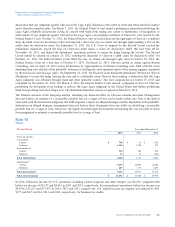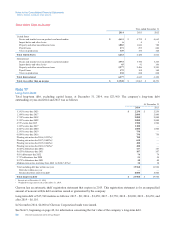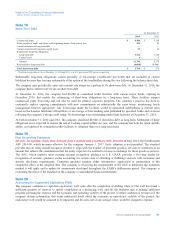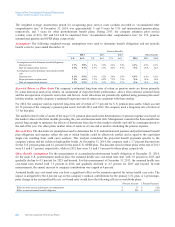Chevron 2014 Annual Report Download - page 57
Download and view the complete annual report
Please find page 57 of the 2014 Chevron annual report below. You can navigate through the pages in the report by either clicking on the pages listed below, or by using the keyword search tool below to find specific information within the annual report.
Notes to the Consolidated Financial Statements
Millions of dollars, except per-share amounts
Income taxes are not accrued for unremitted earnings of international operations that have been or are intended to be
reinvested indefinitely. Undistributed earnings of international consolidated subsidiaries and affiliates for which no deferred
income tax provision has been made for possible future remittances totaled approximately $35,700 at December 31, 2014.
This amount represents earnings reinvested as part of the company’s ongoing international business. It is not practicable to
estimate the amount of taxes that might be payable on the possible remittance of earnings that are intended to be reinvested
indefinitely. At the end of 2014, deferred income taxes were recorded for the undistributed earnings of certain international
operations where indefinite reinvestment of the earnings is not planned. The company does not anticipate incurring
significant additional taxes on remittances of earnings that are not indefinitely reinvested.
Uncertain Income Tax Positions The company recognizes a tax benefit in the financial statements for an uncertain tax
position only if management’s assessment is that the position is “more likely than not” (i.e., a likelihood greater than 50
percent) to be allowed by the tax jurisdiction based solely on the technical merits of the position. The term “tax position” in
the accounting standards for income taxes refers to a position in a previously filed tax return or a position expected to be
taken in a future tax return that is reflected in measuring current or deferred income tax assets and liabilities for interim or
annual periods.
The following table indicates the changes to the company’s unrecognized tax benefits for the years ended December 31,
2014, 2013 and 2012. The term “unrecognized tax benefits” in the accounting standards for income taxes refers to the
differences between a tax position taken or expected to be taken in a tax return and the benefit measured and recognized in
the financial statements. Interest and penalties are not included.
2014 2013 2012
Balance at January 1 $ 3,848 $ 3,071 $ 3,481
Foreign currency effects (25) (58) 4
Additions based on tax positions taken in current year 354 276 543
Additions/reductions resulting from current-year asset acquisitions/sales (22) ——
Additions for tax positions taken in prior years 37 1,164 152
Reductions for tax positions taken in prior years (561) (176) (899)
Settlements with taxing authorities in current year (50) (320) (138)
Reductions as a result of a lapse of the applicable statute of limitations (29) (109) (72)
Balance at December 31 $ 3,552 $ 3,848 $ 3,071
The decrease in unrecognized tax benefits between December 31, 2013, and December 31, 2014 was primarily due to the
expiration of certain U.S. foreign tax credits in 2014, which had no impact on the company’s results of operations.
Approximately 68 percent of the $3,552 of unrecognized tax benefits at December 31, 2014, would have an impact on the
effective tax rate if subsequently recognized. Certain of these unrecognized tax benefits relate to tax carryforwards that may
require a full valuation allowance at the time of any such recognition.
Tax positions for Chevron and its subsidiaries and affiliates are subject to income tax audits by many tax jurisdictions
throughout the world. For the company’s major tax jurisdictions, examinations of tax returns for certain prior tax years had
not been completed as of December 31, 2014. For these jurisdictions, the latest years for which income tax examinations had
been finalized were as follows: United States – 2008, Nigeria – 2000, Angola – 2001, Saudi Arabia – 2012 and Kazakhstan –
2007.
The company engages in ongoing discussions with tax authorities regarding the resolution of tax matters in the various
jurisdictions. Both the outcome of these tax matters and the timing of resolution and/or closure of the tax audits are highly
uncertain. However, it is reasonably possible that developments on tax matters in certain tax jurisdictions may result in
significant increases or decreases in the company’s total unrecognized tax benefits within the next 12 months. Given the
number of years that still remain subject to examination and the number of matters being examined in the various tax
jurisdictions, the company is unable to estimate the range of possible adjustments to the balance of unrecognized tax benefits.
On the Consolidated Statement of Income, the company reports interest and penalties related to liabilities for uncertain tax
positions as “Income tax expense.” As of December 31, 2014, accruals of $233 for anticipated interest and penalty
obligations were included on the Consolidated Balance Sheet, compared with accruals of $215 as of year-end 2013. Income
tax expense (benefit) associated with interest and penalties was $4, $(42) and $145 in 2014, 2013 and 2012, respectively.
Chevron Corporation 2014 Annual Report 55
























